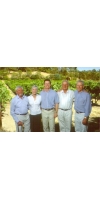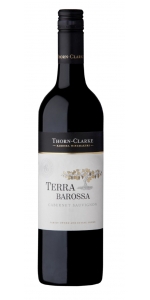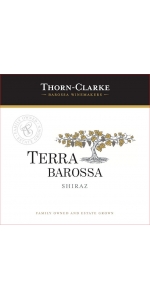Wine from Thorn Clarke - Terra Barossa

The Thorn Clarke Terra Barossa Estate
The winery owners are David and Cheryl Clarke (born Thorn) and their son Sam is the manager of the winery. The Thorn-Clarke family has a long history in the Barossa - six generations of involvement in the region's world famous wine industry. The Thorns have been grape growers in the Barossa since the 1870's. David Clarke's passion for the wine industry lead to the planting of the Kabininge vineyard outside of Tanunda in 1987, which represents the start of a deeper involvement by the family in the Barossa wine industry.
The Thorn Clarke Terra Barossa Vineyards
Terra Barossa pays tribute to the rich, fertile soils of the region which contribute to wines of such great character. The free draining soil structure combined with the continental climate of warm days and cool nights enables them to produce elegant wines with good varietal character.
Thorn Clarke Terra Barossa Cabernet Sauvignon is made from 100% Cabernet Sauvignon
The range is named is named in honor of the rich soils in the region which are a major factor in the Barossa’s reputation as one of the great wine regions of the world.
The wine shows a bright red with a purple hue on release. Lifted blackcurrant balances the fresh herb characters on the nose. A hint of eucalyptus is evident. The palate has bright currant characters throughout. Spice and chocolate add to the complexity of the wine. The tannins are ripe and grainy and give the wine good structure.
Thorn Clarke Terra Barossa Shiraz is made from 100 percent Shiraz
Comments
Deep purple red. Aromas of ripe plums, cherries and earth with subtle notes of vanilla and cloves. The aromas follow through onto the palate with a fruit focus, subtle oak notes and soft, rounded tannins. The wine walks the line between medium and full bodied with a plush mouthfeel.
Vinification Notes
The grapes are crushed and de-stemmed into fermenters. Yeast is added immediately once in fermenter and the ferments are pumped over twice daily to maximise colour, tannin and flavour extraction. Cooling is used to ensure ferment temperatures remain in the 22-25 degree celcius range which will allow the fruit to display maximum fruit expression. Pressing then occurs approximately seven days after crushing and the wine is then put into predominately American oak to mature.
Review:
"This is a gently spicy shiraz with aromas of red berries and plums, gentle spice and a little perfume and spiced pastry, too. The palate has a supple and fleshy feel with bright and ripe red to dark-berry flavors. Soft, plump tannins. Drink now. Screw cap."
-James Suckling 91 Points
- back
Selected Options
Wineries
Categories
Pricing
Countries
Regions
Grape Types
Wineries
Organic/Free Shipping
Filippino Elio Barbera d'Alba Superiore is made from 100% Barbera.
This 100% Barbera shows an intense fruity bouquet with subtle vanilla and toasty notes. Full and spicy flavors, and a good body.
The grapes are pressed and the stalks are removed. The must ferments at about 26°C for 6-9 days. After racking, before the end of fermentation, the new wine is put in 225 liter Allier barriques for long months, depending on the vintage and the wine’s structure. It is subsequently moved into stainless steel vats to rest for some months before bottling.
Fullerton Three Otters Pinot Noir is made from 100% Pinot Noir - 7-40 years old
This Willamette Valley blend hails mainly from three different vineyards in the north, east, and south of the Willamette Valley, with a smaering from five of Fullerton's other sites. The soils of the vineyards represent the breadth and diversity of the Willamee Valley with both sedimentary- and volcanic-based soils.
Blueberry and ripe strawberry with a dash of baker’s spice, bramble, and herbs. The palate carries the fruit forward elegantly with balanced tannins following. Intriguing complexity and depth—an impressive wine for all.
This wine comes from 100% destemmed rotator barrels fermented at ambient temperature reaching a peak temperature of 73° F. The rotator barrel spun twice daily during fermentation yielding a gentle extraction. After fermentation, the wine went through a three-week extended maceration, allowing the tannins to polymerize, soffening the wine. Aged for 12 months in French oak barrels and three months in tank, the wine was then bottled after filtration.
This wine is handled very gently in the cellar allowing the nuances of the delicate fruit to be preserved and the wine to be very approachable in its youth. We have a preference for pump-overs versus punch-downs for its smoother extraction and softening effect on the tannin. To retain freshness and verve we age most of the wine in tank. However, we softened up and rounded out about 25% of the blend in barrel. The result is a fresh, fruit forward, yet earthy and intriguing, Pinot Noir.
Serve this wine slightly chilled, and pair it with dishes of earthy mushrooms, like chanterelles and morels, light cuts of meat, charcuterie and cheese.






